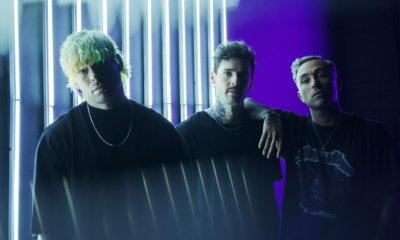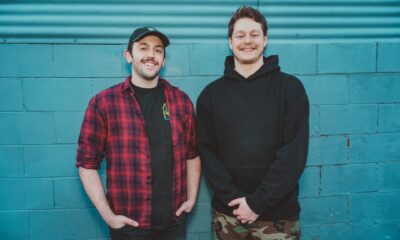Blues
Eric Gales Discusses His New Album ‘Crown,’ Working with Joe Bonamassa, and Pulling Musical Magic out of Negative Places [w/ Audio]
Incendiary blues player Eric Gales joins us for a chat about his banger of a new album, ‘Crown’ (Provogue/Mascot), which showcases the man like never before; Touching on themes of racism, triumph, and the power of love.
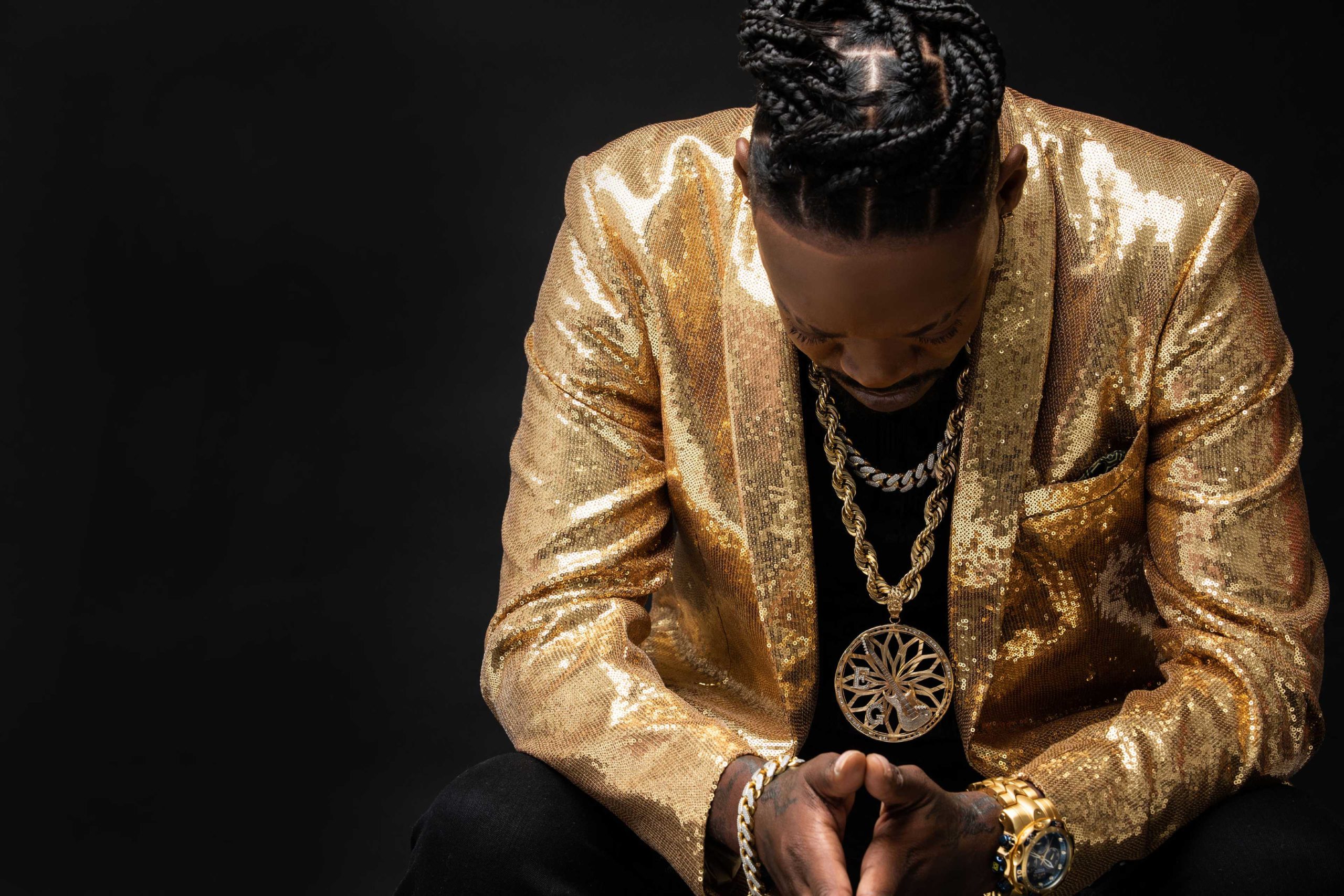
Eric Gales is an incendiary blues player. With over three decades and 18 albums to his name, his love for crafting and playing music is undying. He’s a lesser-known commodity than he should be, his battle with drink and drugs holding him back in many ways, but never in regards to his musical output.
Over five years sober, creatively rejuvenated, and sagely insightful, Eric is ready to embrace his career. Arriving this week, Crown, Eric’s impressive new album on Provogue/Mascot, showcases the man like never before. Touching on themes of racism, triumph, and the power of love, Crown is rife with exquisite songcraft, sure to appeal to fans of blues and rock alike. Produced by revered blues guitarist Joe Bonamassa and Josh Smith, this album features Eric at his most razor-sharp focus, delving into themes and genres like never before. There is a level of confidence on this album that is impossible to deny. It’s a total banger!
The songs on Crown were co-written by Gales, Smith, and Bonamassa, and feature contributions from LaDonna Gales, and songwriters such as Tom Hambridge, James House, and Keb Mo. The album was recorded at Sound Emporium Studios in Nashville, and overdubs were tracked at Ocean Way, also in Nashville, and Earthtone Studios in Greensboro, North Carolina.
Our heartfelt thanks to Eric for taking a healthy chunk out of his afternoon a few weeks ago to field a few questions with us over the phone. The audio is available here if you’d prefer to hear his answers in real-time.
I was initially unsure how to approach this interview Eric. Your new LP kind of plays like an open wound; there’s a lot of stuff on there, you know?
Eric Gales: “It is.”
It’s lovely, and it’s full of introspection. I’m curious if that was challenging for you to put into music?
“It was. That’s a good question too. If it’s challenging for you to find the right questions to ask, then imagine how challenging it was approaching some of the topics that, honestly, I believe needed to be spoken about, especially from my own experiences and my own perspective in some of those categories. And try to have it done in a way where I’m not preaching to people, but we are having a conversation with the masses. The whole goal was not to be particularly focused on the guitar work because I’ve got 18 records. I think it’s maybe established that I can play, just a little bit. It focused on vocals and the lyrics and melodies, and the song content for this record.
“A lot of people may be thinking that we’ve got three guitarists involved, two producers, and one directing, and this album will be saturated and maybe not what I’m looking for. I mean, those have been done, and they get done all day, every day. It was more about going into the next year and stepping this into a whole other level. These are topics and are very near and dear to my heart; Experiences in my life that have happened. It was very emotional trying to track these songs. There wasn’t a day that went by where somebody didn’t have tears in their eyes because of how powerful it was. And if that was the type of reaction that was had by the people that were involved with the record, then I can only hope and imagine that the listeners get just a pinch of what the intention was.
“I was just saying in another interview before you that I want the listener from start to finish to feel like they have been on a cruise to 16 different destinations. All of them are on this one journey, and every last one of them is as meaningful as they are all put together. We’ll have some good times; we’ll cry, we’ll think, we’ll have some fun. We’ll laugh. And all of that will be on one record.
“I think the time is now for me to put a record out that gives the listener that sensation. It is very pleasing to listen back to it as if I or anybody I know was involved with that record as if we had nothing to do with it. As if it was somebody else. I come back to it, and I am just as impressed by the messages and everything we put into it. That gives me the satisfaction that I’m very proud to have this record come out on January 28th. We put the work into it, and now it’s time for it to be placed out there and be enjoyed.”
You have decades’ worth of music to your name, yet many won’t know anything about you. Do you think that’s due to the genre of blues music? It’s very much a niche genre.
“That could be. It’s very possible. It could be that there’s a lack of exposure from record labels. It could be a whole lot of things. It’s not because I haven’t been out there doing it. It won’t be that. For this record and their approach, that’s definitely stepped up in magnitude for the exposure to the ears and the hearts and the minds and the souls of as many people as possible. The intention is to step up everything. My marketing, branding, and website team are stepping it up to the next level because I’m aware of Eric Gales as a household name, but everybody else isn’t.
“Crown is my opportunity to try and make it me. Again, that’s not my main goal and intention, if you don’t know who I am, it could be a lot of reasons, but I’m going to do everything that I can to try and ensure that you do. All I want to do is keep spreading what I’ve got going on to as many people as possible. However, it catches fire will be just fine.”
When you write music, do you always start with the guitar? Do you ever put lyrics down in a journal?
“Yes, predominantly. It could be a bass riff. It could be a drum rhythm. Different aspects may fuel the beginning of a tune as we go. Predominantly, it will be a groove or something that I have come up with myself or in collaboration with somebody, and we just work it out from there.”
Do you ever find that it’s more challenging to put lyrics to the guitar licks that you’ve put together?
“I’m the first to admit that putting lyrics to a song is always a challenging thing for me. I will know what I’m going to talk about when I have a melody, but putting the right words to it is something that I have always found an effort. I haven’t had a problem calling on some of the great musicians that I have co-written with to help my point get across. I’m not here to say that I know it all or that I have all of the top ten expertise; that’s why I think that two heads are better than one.
“Collaborating is a great thing. Sometimes you can find that you make things gel a little bit better when you collaborate with some people. So yeah, if it were rap, I’d have no problem; I’ve done it before. I’ve got history with Three 6 Mafia. That seems to come out of me simply. Putting lyrics to a song, though? I don’t know why that seems more difficult. That’s why I call in the help that I need.”
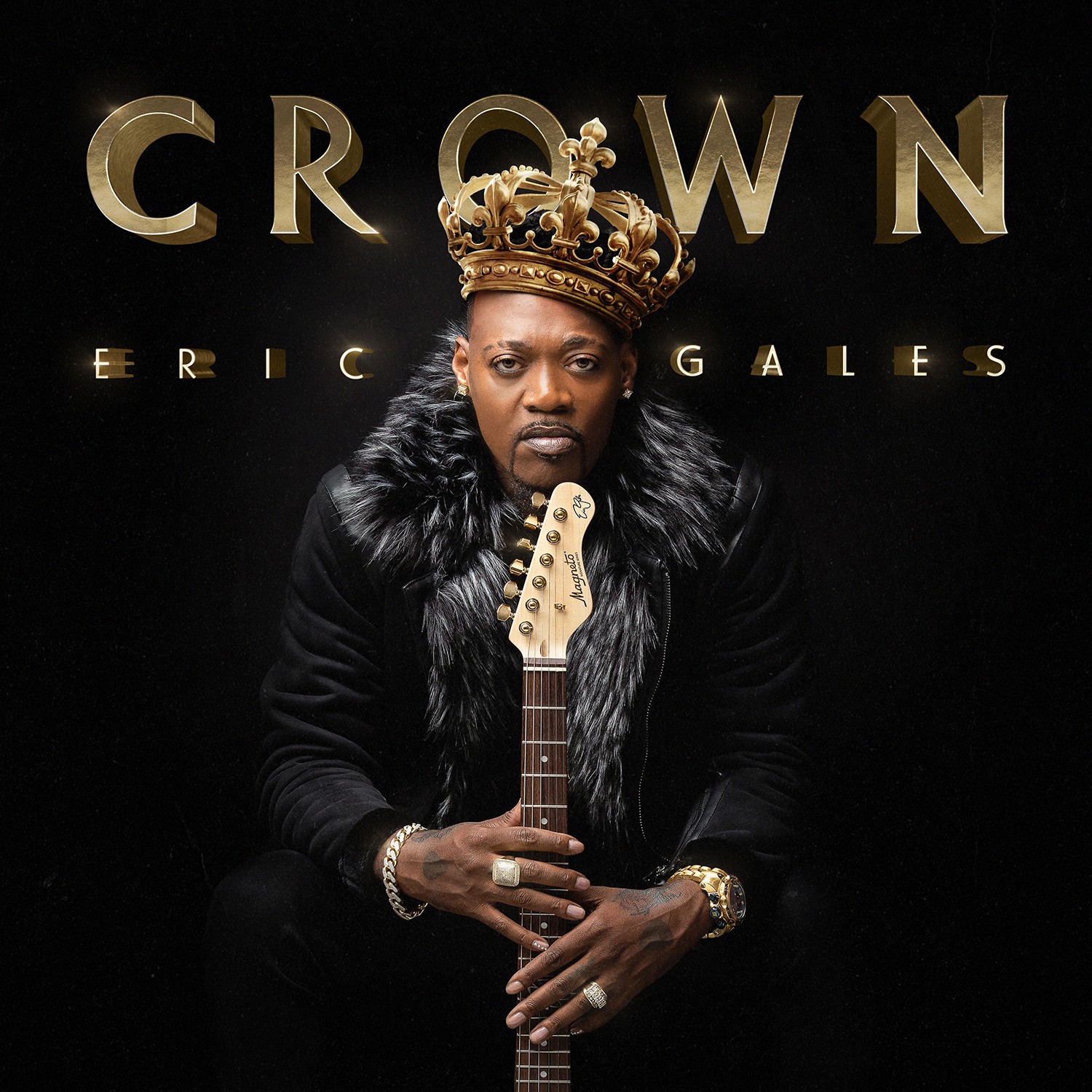
Artwork for the album ‘Crown’ by Eric Gales
When you went into the studio to start putting this album together, what did you go in with? Did you have stems written? Or did you go in clean and just start writing?
“Me and Joe started writing this record the day after George Floyd passed away. We went in, and I just started talking, and that’s how some of the lyrical material became prevalent in this record. We just kept on going, and then the music came, and all Joe told me to do was just keep on talking because there was a bunch of material coming out of what I was saying. Because I was enraged; I was infuriated; I was hurt. A lot of things came out in those close couple of days that helped fuel some of the best songs on this record. A lot of things from my life’s personal experiences too. Too close to the fire, man. I’ve been too close to the fire way too many times in my life. I’m a survivor.
“I’m five and half years clean from all of the dope that I have used in my life. I found my wife. There’s a storm out here that needs to be cleared up. If we could all come together and not be apart, that would bring some sunshine to the storm. All of these things are relevant to the world and what’s going on in it. It’s a terrible situation, and it’s been a terrible case. It’s only going to get worse until we find some kind of way to make it better. And to find the people that want to help make it better.
“I had no problem going that route because the people (each and every one of us that was involved in doing this record) every day were crying. We were shedding tears, Keb Mo and everybody in the studio. ‘Stand Up’ and all of the songs that are on this record have a severe meaning to them that the world can learn from. I am very proud to stand behind this entire record. It’s a voyage that stops in various destinations, and I’m very proud of it.”
How does one discuss both racism and addiction in an interview? I’m Caucasian, and I’m not in recovery. I feel like I’m broaching a really taboo subject, you know?
“It is pretty heavy, man. I just hope that you never have to be personally involved in it, man. But that’s a very good point. Listen to this record, and that’s how you approach it. That’s how you discuss it. I don’t know; I happen to have been affected by both. There’s a story for people who have not been affected by it, and it even gives them insight into those that have been affected by these things.”
Would you describe Crown as a pandemic record then? From top to bottom, you totally created it during the pandemic?
“Yeah, you know, I guess you could say that. We didn’t sit idle twirling our thumbs; we went to work. It was a record that we wanted to have done and put out, and we were able to do it. I’ve never been asked that question before, but I guess it is a pandemic record. That in no way lessens the value of it nor magnifies it in my eyes, it just happens to have been done during a time when everybody was in the midst of some turmoil. That could have helped fuel it because we were all in a scenario of being in despair, destitute, hurt, confused, and feeling like there was no way out. We went into the studio and tried to do something that tried to help a world be better in the time before this record comes out.”
Can you tell me how you met LaDonna?
“I met LaDonna at Carolina Blues Festival in Greensboro. I saw her, and two months later, we got married.”
Amazing. I’ve got to assume that “I Found Her” is a song written for her?
“Absolutely.”
It’s got one of the best guitar solos on the album, man.
“(laughs) I couldn’t shorten that one; I had to go big for her.”
We can’t do this interview and not talk about Joe Bonamassa. Can you talk a little bit about your long history with Joe?
“Yeah, we met almost 30 years ago. He was opening up for my band in Bloodline. We met, and our careers went in two different ways, and then we rekindled, and we got back into the presence of each other almost 28 years later. We came back together in a grand way, and I can’t be more ecstatic and pleased about it. He’s one of my best friends. I’d do anything for him, and he’d do the same for me. He told me, ‘Eric, I’m going to help you get where you need to be.’ So far, it’s working. I’m heading on my way, and it’s a beautiful thing.”
I interviewed him about a year ago to the day talking about that movie Guitar Man that he put out. It’s cool that you must have gone right into the studio with him shortly afterward and put together an album that’s just so drenched in blues. It’s amazing.
“Thank you, man. Appreciate it.”
Do you believe that there is a difference between natural music talent versus learned music talent?
“I do. I can’t really elaborate on what I believe the difference is, but one way or another, the end goal is to try and be the best you can be. It doesn’t matter how the start is; it’s how the finish is. Either way can end you up in very peculiar situations as well as very nice and rewarding situations. I don’t really have much to say on the differences between the two.”
I ask that question having zero talent. I tried to play the guitar as a teenager, and it was just obvious that I had nothing in me.
“(laughs) I mean, I think it’s there, man. You maybe needed the right person to help pry it out of you.”
You’re more optimistic than I am.
“I’m an optimistic person.”
You’ve put this album together, and now obviously, the next step is bringing it to the people and playing it live. Have you thought about what that’s going to look like in these surreal times?
“No, not really. That’s not even in my mind even to think about. All I know is it’s my job just to put it out there. However they receive it is how they receive it.”
Has it been hard for you as a musician who must enjoy playing live to go through a pandemic like we are and not be able to play live?
“Of course. It’s been terrible. We’ve had the opportunity when we can to get out and do our thing. It’s been amazing, and we don’t take those things for granted. I also think that the people in the audience don’t take those times for granted either because we don’t know when they will be stripped away again.”
So, where in the world is your favourite live venue to perform in, and what makes it so special?
“Everywhere. I don’t have a favourite. It’s everywhere I have the opportunity to share my story with somebody, then that’s my favourite place.”
Who do you consider a musical inspiration? And what makes him or her appeal to you?
“That’s a loaded question because there are a lot of them out there for me. Eric Johnson, Robin Trower, Freddie King, Albert King, Muddy Waters, John Lee Hooker; all of them. They’ve all got a significant part that’s very attractive to me. They are my inspiration, and I take it and use them all for that.”
Let’s say someone asks you where they should start with your music; what album would you recommend to them?
“I really don’t know. Bookends would be good. Middle Of The Road, I think, would be nice. I could say Crown; Crown is a good place to start and work your way backward. You’d see the evolution of how it all came together.”
Well, that’s what I’m going to be doing (laughs).
“There you go.”
I had touched on blues being a sub-genre before. I think blues is one of the oldest forms of music. Why do you think rock n’ roll has just blown up over the past 60 years, and blues has remained a sub-genre?
“I don’t know, man. It just is. Rock is a byproduct of blues and gospel that made a twist. How it wound up being the hugest thing? I don’t know. People like rock n’ roll, I guess. It’s definitely a byproduct of early blues and gospel. We’ll see what happens in the next hundred years, but I don’t think it’s going away.”
The only downside of hearing Crown as I’ve listened to it, which is digital press files, is that I immediately want to hear it live. I now wish that I’d heard it live before I heard the studio tracks. I think blues really smokes when it’s done live.
“If this pandemic ever turns around, you will. We have tours that I just found out today that are being moved around. The European tour has got to be moved again for the second time. For the third time, actually, and I’m really not in good spirits right now because I’m really upset and infuriated behind that. I’ve got some stuff that is still moving forward, but, you know, everybody has got to do what they need to do to go forward. We may have an opportunity for you to hear this record live. We have all intentions of going forward with this record. If we don’t die, then we will be on the stage somewhere.”
Have you ever done anything digital? Like setting up in a studio and filmed something that’s staged and then go about streaming it?
“Yeah, but it’s not the same in my book. I need energy. I need to swap that with the crowd. It’s just not the same.”
-

 Alternative/Rock2 weeks ago
Alternative/Rock2 weeks agoThe Warning Shake the Foundations of a Sold-Out Leeds Stylus [Photos]
-

 Alternative/Rock5 days ago
Alternative/Rock5 days agoThe Cruel Knives Headline Top Night of British Rock at Manchester’s The Lodge [Photos]
-

 Hip-Hop/Rap1 day ago
Hip-Hop/Rap1 day agoFormz: “I was always the confident kid in school, with a passion for entertaining and being the centre of attention..”
-

 Alternative/Rock5 days ago
Alternative/Rock5 days agoThe V13 Fix #012 w/ Dååth, Unearthly Rites, maybeshewill and more
-

 Alternative/Rock2 weeks ago
Alternative/Rock2 weeks agoThe V13 Fix #011 w/ Microwave, Full Of Hell, Cold Years and more
-

 Indie2 weeks ago
Indie2 weeks agoDeadset Premiere Music Video for Addiction-Inspired “Heavy Eyes” Single
-
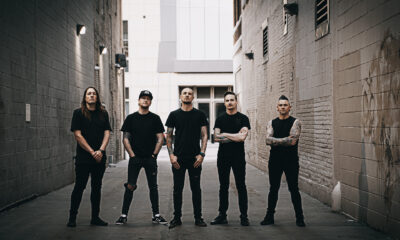
 Interviews2 days ago
Interviews2 days agoKill The Lights Michael ‘Moose’ Thomas Talks Success, International Bandmates and more
-

 Folk2 weeks ago
Folk2 weeks agoKatherine Perkins Strikes the Right Tone with Her “Hold On” Music Video Premiere

